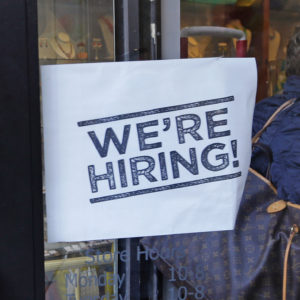The Labor Department tells us that 130,000 jobs were created in August. However, around 25,000 were temporary census workers hired by the federal government. That puts the August total for new private-sector jobs at about 100,000.
A few days before the Labor Department numbers came out the ADP Research Institute issued its report indicating that there were 195,000 private-sector jobs created in August.
That’s a BIG difference.
Maybe August is just a “quirky month” says Larry Kudlow, President Trump’s National Economic Council director.
For his part Trump is furious at the “fake news” for pointing out that the Labor Department numbers were well below economists’ expectations.
So, was August a good month for jobs or not?
There is no question that the economy continues to add jobs each month. It’s been doing that without a break since 2010 following the Great Recession.
There is also no question that the average monthly jobs rate in 2019 (143,000) is considerably less than in 2018 (192,000) according to the Labor Department.
We also know that the manufacturing sector, while adding a couple thousand jobs over the last few months, has shrunk the last two quarters thus meeting the criteria for being in a recession.
This would be consistent with the ADP August data that show that very small businesses (fewer than 20 employees) shed 1000 jobs in the goods-producing sector.
The good news, according to ADP, is that overall these very small businesses added 26,000 jobs in August, reversing three consecutive months of job losses totaling 105,000.
Does this mean that these very small businesses and the economy are healthy, the Labor Department numbers are wrong and the job losses to very small businesses reported by ADP for May, June and July were aberrations?
I don’t believe so.
The evidence is clear that the economy is slipping, and consumers are feeling it.
The University of Michigan’s consumer sentiment survey found a sharp decline in consumer confidence in August.
A Quinnipiac University poll taken at the end of August also found public sentiment shifting negatively on the economy. “For the first time since President Trump was elected, more voters say that the national economy is getting worse than getting better, with 37 percent saying it is getting worse, 31 percent saying it is getting better, and 30 percent saying it is staying the same.”
The significance of these two polls cannot be overstated. Reduced consumer confidence leads to less consumer spending, which makes up 70 percent of economy.
Even the low unemployment rate will not overcome the impact of consumer sentiment.
Americans might have jobs, but many are underemployed, have not seen adequate wage growth and are in serious financial problem. Families today are deeper into debt because of student loans, medical bills, housing and transportation.
Not only did the average family not get the $4,000 raise in income promised by the 2017 tax law, American taxpayers paid $93 billion more in 2018 federal taxes than the year before.
Now higher tariffs are increasing the costs of consumer products.
The bottom line is that a large percentage of American families are financially stressed, worried about their future income and facing higher consumer costs. The result is less spending on goods and services.
Small businesses, which account for all net new jobs in the nation, are particularly harmed by less consumer spending and must adjust accordingly.
The 2017 tax law that didn’t help consumers also didn’t make small businesses more resilient to an economic downturn.
A poll by Businesses for Responsible Tax Reform found that 72 percent of small business owners say that the 2017 tax law had either no positive effect on their business or a negative effect. As a result, small businesses, which are first to feel consumers tightening their wallets, must respond quickly with employment adjustments.
Of course, it is possible that economy is great as the president insists and the good August news of job growth for very small businesses will continue in September and for months to come.
However, it is more likely that Kudlow was correct. August was a “quirky month” and a slumping economy is in our future.

